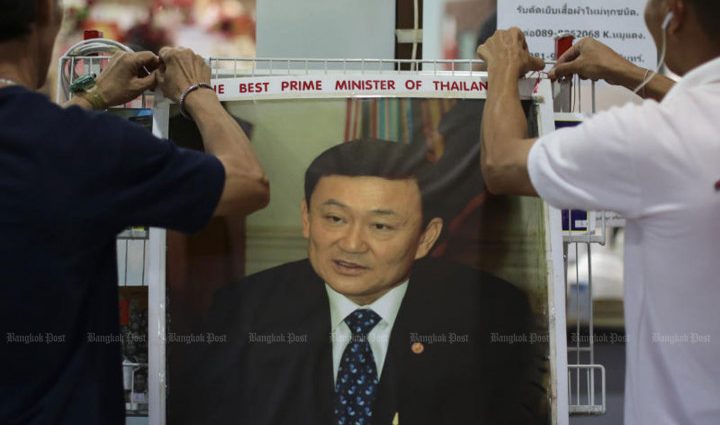
Former prime minister Thaksin Shinawatra must serve his sentence in prison, not under house arrest, if he returns home, according to caretaker Deputy Prime Minister Wissanu Krea-ngam.
Mr Wissanu, the cabinet’s legal expert, was responding to Thaksin’s latest tweets saying he wanted to return home before July 26, his 74th birthday, to care for his grandchildren, and would enter the “legal process”.
According to Mr Wissanu, there are three types of cases involving Thaksin.
The first were cases in which courts had already given judgement and Thaksin had not returned to face punishment.
The second type were cases in which court rulings were still pending.
Third were cases in which courts had already passed judgement and found Thaksin not guilty.
Mr Wissanu said authorities had to separate out the cases, and follow the appropriate legal procedures for each one.
When asked whether the former prime minister could apply for release on bail in cases where a court had already sentenced him to prison, Mr Wassanu stressed his belief that Thaksin must be imprisoned, as if he had been in court to hear the ruling.
A former justice minister had earlier floated the idea that prisoners could serve sentences in places other than prisons, but that was just an idea and nothing more had been done about it.
“Inmates must be sent to state detention facilities and they cannot be placed under house arrest,” the cabinet’s legal specialist said.
The former justice minister referred to was Somsak Thepsuthin, who quit the cabinet to join the Pheu Thai Party in March. Thaksin’s youngest daughter Paetongtarn Shinawatra, 36, is one of Pheu Thai’s three candidates for prime minister. (continues below)

Deputy Prime Minister Wissanu Krea-ngam during the last cabinet meeting on March 14. The government’s legal specialist said on Tuesday that former prime minister Thaksin Shinwatra must serve his sentences in prison if he returns home. (Photo: Chanat Katanyu)
Asked about a royal pardon, Mr Wissanu said there were two types of royal pardons – those sought by authorities for convicts, and those sought by individual prisoners seeking a reduction in their sentence.
Whether or not the royal pardon was granted was another matter.
To seek a royal pardon through a royal decree, individual prisoners must serve at least eight years, or one third of their jail term, he said.
Thaksin was ousted from office by a 2006 military coup and is living in self-exile after being sentenced in absentia for abuse of power, a charge he always insisted was politically motivated. He remains very popular with his many followers.
Caretaker Prime Minister Prayut Chan-o-cha played down Thaksin’s latest tweets about returning to Thailand, saying he had not seen them.
“It’s up to him and the juridical procedures,” Gen Prayut replied when asked to comment.
Asked whether Thaksin’s tweet was sending a signal to Gen Prayut, seeking a deal, he said, “Did he send a signal via air. I didn’t receive any signal.’’
Asked how he perceived Thaksin’s intentions in making the announcement only a few days before the general election, and if it was just a political gambit, Gen Prayut smiled and said, “You asked this question, so you answer it.’’

